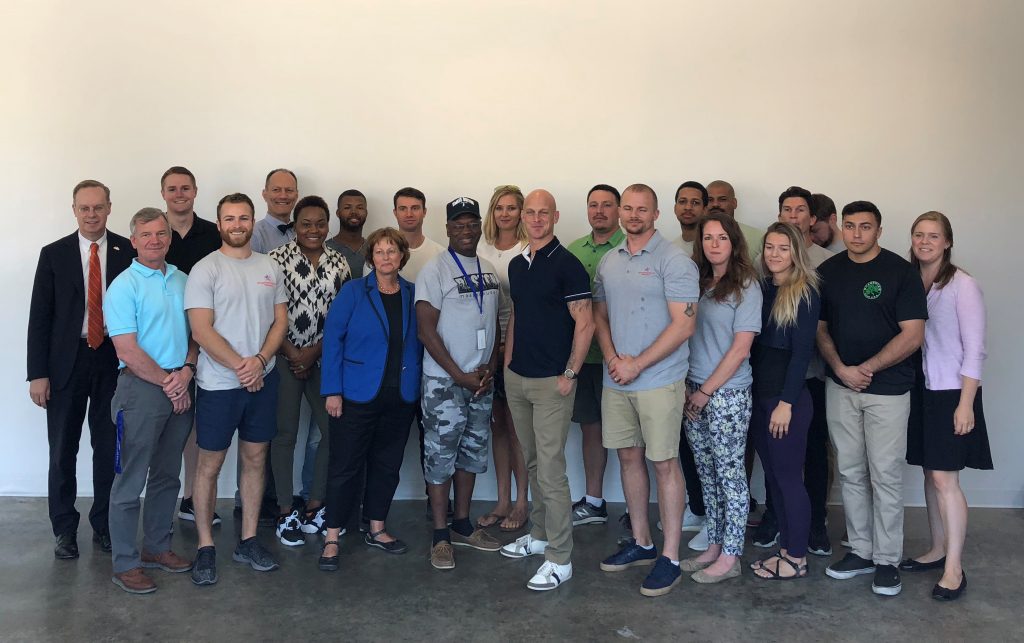For some military veterans, the first day of school at a new college or university is as challenging as a deployment to a foreign country. Immersion in a new culture and reintroduction to a demanding academic environment can make the transition from military to higher education difficult. To ease the transition, the Warrior-Scholar Project (WSP) hosted its fourth intensive one-week academic boot camp at Syracuse University July 14-July 21.

The Warrior-Scholar Project coordinates immersive academic preparation courses for enlisted military veterans of any skill level at America’s top universities. The program is designed to help military veterans develop and rediscover the skills and confidence necessary to successfully complete four-year undergraduate degrees. Because veterans are non-traditional students with unique experiences distinguishing them from their college peers, WSP also uses the programs to help prepare participants for the emotional and cultural adaptations required to succeed in a higher education setting.
“The Warrior-Scholar Project enables transitioning enlisted service members to become better prepared academically as they establish themselves at their respective universities and become leaders in the classroom,” says Ron Novack, executive director of Syracuse University’s Office for Veteran and Military Affairs. “We are honored to be a Warrior Scholar partner as we continue on our charge to be the ‘best place for veterans’ and afford these men and women the greatest opportunity to pursue their dreams and succeed academically.”
This year’s class of 14 Warrior Scholars hailed from California, Florida, Rhode Island, North Carolina, New York, Mississippi, New Jersey, Wisconsin and Massachusetts and had served in the Army, Marine Corps, Navy Air Force and Coast Guard. All participants were enlisted service members whose careers spanned anywhere from 3-17 years.
WSP at Syracuse University is a collaborative effort between the Office of Veteran and Military Affairs and the College of Arts and Sciences. With the support of Dean Karin Ruhlandt and Senior Associate Dean Gerry Greenberg, Syracuse University provides faculty for each of the five seminars offered throughout the week. Syracuse faculty who taught during this year’s program include:
- Tessa Murphy, assistant professor, Maxwell School of Citizenship and Public Affairs
- Mark Schmeller, associate professor, Maxwell School of Citizenship and Public Affairs
- Craig Champion, professor, Maxwell School of Citizenship and Public Affairs
- Andrew Cohen, professor, Maxwell School of Citizenship and Public Affairs
- Corri Zoli, research assistant professor, Maxwell School of Citizenship and Public Affairs
“The program at Syracuse University taps into the immense potential of post-9/11 veterans and reduces obstacles to success, addressing veterans’ misperceptions about college and building their confidence through an intense academic reorientation” says Sidney Ellington, executive director of WSP. “Syracuse shares our goal of seeing America’s veterans succeed in and outside the classroom—making them an ideal Warrior Scholar Project partner.”
WSP launched its first program at Yale University in 2012 with nine participants. Since then, WSP has expanded to encompass 17 top schools, including Syracuse University, and is on track to host more than 245 veterans at boot camps across the country in 2018. In addition to Syracuse University, WSP graduates have gone on to enroll at top schools, including Yale University, Harvard University and Georgetown University.
“My participation in Warrior-Scholar Project has profoundly impacted my life,” says Kaedy Puckett, WSP program alumni. “I didn’t know what to expect going into the program, but I left with a sense of confidence I had lost. While my military experience instilled discipline, the value of leadership and the importance of hard work, the academic setting is an entirely new way to challenge yourself. WSP flipped a switch in me that reignited goals I originally wanted to reach and served as a catalyst to get my life back on the path I set out to accomplish.”
“Stepping onto a college campus is intimidating for anyone and can be even more so for active or veteran service members,” says Mike Haynie, vice chancellor and executive director of the Institute for Veterans and Military Families. “The important role the Warrior-Scholar Project plays in engaging these military members with universities around the U.S. is vital to their future career success. We are proud to be a part of that work. It was an honor to host this year’s participants and share our educational experience with them.”
Each WSP boot camp is run by a team of WSP staff and student veterans and taught by university professors and graduate students. An intensive syllabus composed of both classic and modern scholarly works guides participants as they learn how to frame their ideas in an academic context, think critically, and formulate scholarly arguments. Participants not only learn the subject-matter material, but they also learn how to learn.
“Because of their technical training and diverse, cross-cultural experiences, military veterans have much to contribute to higher education, beyond their strengths in discipline, teamwork, and resilience,” says Corri Zoli, chair, Board of Academic Advisors, WSP, and director of research, Institute for National Security and Counterterrorism at Syracuse University. “Yet too often veterans are an uncommon sight at four-year colleges. The presence on Syracuse University’s campus of venerable veterans’ programs, such as the Defense Comptrollership Program and the Military Visual Journalism Program, means our partnership with WSP is a natural fit, and it works exceptionally well. As an instructor, I can attest to how this college-readiness program strives to make veterans part of a wider academic conversation and to become campus leaders.”
WSP funders, including host universities and private donors, cover the entire cost of the program for participants, excluding travel. Student veterans attending Syracuse University boot camp will reside in campus housing and attend lectures in various classrooms.
To learn more about the program, visit www.warrior-scholar.org.
